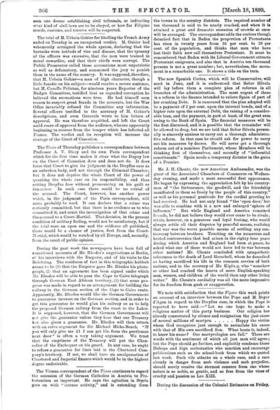The Times of Thursday publishes a correspondence between Professor A.
V. Dicey and its own Paris correspondent which for the first time makes it clear what the Dupuy law on the Court of Caseation does and does not do. It does force that Court to give its judgment in the Dreyfus case as an unbroken body, and not through the Criminal Chamber; but it does not deprive the whole Court of the power of quashing the whole case on its responsibility, and thus netting Dreyfus free without pronouncing on his guilt or innocence. In such case there could be no retrial of the accused. The Court, however, has another power which, in the judgment of the Paris correspondent, will more probably be used. It can declare that a crime was certainly committed, but that there is no evidence as to who committed it, and remit the investigation of that crime and the accused to a Court-Martial. That decision, in the present condition of military feeling, would not be satisfactory, but if the trial were an open one and the evidence all published, there would be a chance of justice, first from the Court- Martial, which would be watched by all Europe, and, secondly, from the court of public opinion.






































 Previous page
Previous page